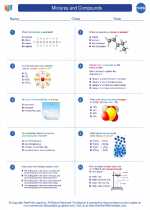Catalysts in Chemistry
In chemistry, a catalyst is a substance that increases the rate of a chemical reaction without itself undergoing any permanent chemical change. This means that catalysts remain unchanged at the end of the reaction, allowing them to be used repeatedly.
Key Concepts
- Activation Energy: Catalysts lower the activation energy required for a reaction to occur, making the reaction happen more quickly.
- Types of Catalysts: Catalysts can be classified as homogeneous (in the same phase as the reactants) or heterogeneous (in a different phase from the reactants).
- Enzyme Catalysis: Biological catalysts called enzymes play a crucial role in catalyzing biochemical reactions in living organisms.
- Catalytic Converters: In industrial and environmental applications, catalysts are used in devices like catalytic converters to facilitate the conversion of harmful pollutants into less harmful substances.
Study Guide
To understand catalysts in chemistry, it's important to focus on the following key points:
- Define the term "catalyst" and explain its role in a chemical reaction.
- Discuss the concept of activation energy and how catalysts influence it.
- Explore the different types of catalysts and provide examples of each type.
- Examine the importance of enzyme catalysis in biological systems.
- Investigate industrial and environmental applications of catalysts, such as catalytic converters.
By mastering these key concepts, you'll develop a comprehensive understanding of catalysts and their significance in chemistry.
.◂Chemistry Worksheets and Study Guides High School. Mixtures and Compounds
Worksheet/Answer key Mixtures and Compounds
Mixtures and Compounds  Worksheet/Answer key
Worksheet/Answer key Mixtures and Compounds
Mixtures and Compounds  Worksheet/Answer key
Worksheet/Answer key Mixtures and Compounds
Mixtures and Compounds 

 Worksheet/Answer key
Worksheet/Answer key
 Worksheet/Answer key
Worksheet/Answer key

The resources above cover the following skills:
Chemistry II
Properties of Matter
Develop and use models to explain the differences between chemical compounds using patterns as a method for identification.
Use mathematical representations to quantify matter through the analysis of patterns in chemical compounds.